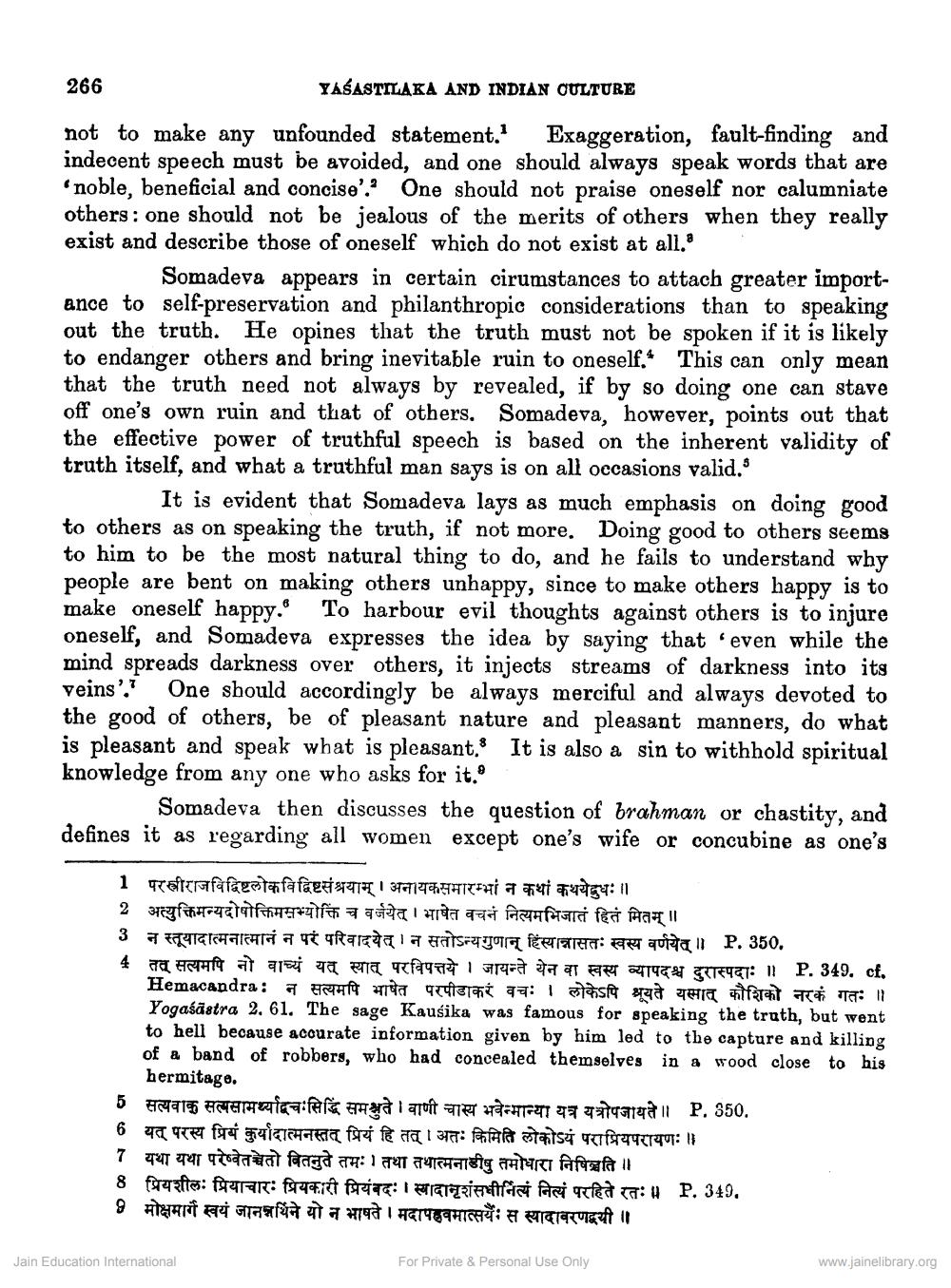________________
266
YASASTILAKA AND INDIAN CULTURE
not to make any unfounded statement.1 Exaggeration, fault-finding and indecent speech must be avoided, and one should always speak words that are 'noble, beneficial and concise'.' One should not praise oneself nor calumniate others: one should not be jealous of the merits of others when they really exist and describe those of oneself which do not exist at all.
Somadeva appears in certain cirumstances to attach greater importance to self-preservation and philanthropic considerations than to speaking out the truth. He opines that the truth must not be spoken if it is likely to endanger others and bring inevitable ruin to oneself. This can only mean that the truth need not always by revealed, if by so doing one can stave off one's own ruin and that of others. Somadeva, however, points out that the effective power of truthful speech is based on the inherent validity of truth itself, and what a truthful man says is on all occasions valid."
It is evident that Somadeva lays as much emphasis on doing good to others as on speaking the truth, if not more. Doing good to others seems to him to be the most natural thing to do, and he fails to understand why people are bent on making others unhappy, since to make others happy is to make oneself happy." To harbour evil thoughts against others is to injure oneself, and Somadeva expresses the idea by saying that even while the mind spreads darkness over others, it injects streams of darkness into its veins'. One should accordingly be always merciful and always devoted to the good of others, be of pleasant nature and pleasant manners, do what is pleasant and speak what is pleasant. It is also a sin to withhold spiritual knowledge from any one who asks for it."
Somadeva then discusses the question of brahman or chastity, and defines it as regarding all women except one's wife or concubine as one's
1 परस्त्रीराज विद्विष्टलोकविद्विष्टसंश्रयाम् । अनायकसमारम्भां न कथां कथयेदुधः ॥
2 अत्युक्तिमन्यदोषोक्तिमसभ्योक्तिं च वर्जयेत् । भाषेत वचनं नित्यमभिजातं हितं मितम् ॥
3 न स्तूयादात्मनात्मानं न परं परिवादयेत् । न सतोऽन्यगुणान् हिंस्यान्नासतः स्वस्य वर्णयेत् ॥ P.350.
4 तत् सत्यमपि नो वाच्यं यत् स्यात् परविपत्तये । जायन्ते येन वा स्वस्य व्यापदश्च दुरास्पदाः ॥ P. 349 cf. Hemacandra: न सत्यमपि भाषेत परपीडाकरं वचः । लोकेऽपि श्रूयते यस्मात् कौशिको नरकं गतः ॥ Yogasästra 2. 61. The sage Kausika was famous for speaking the truth, but went to hell because accurate information given by him led to the capture and killing of a band of robbers, who had concealed themselves in a wood close to his hermitage.
5 सत्यवाक सत्यसामर्थ्याद्वचः सिद्धिं समश्रुते । वाणी चास्य भवेन्मान्या यत्र यत्रोपजायते ॥
P. 350.
6 यत् परस्य प्रियं कुर्यादात्मनस्तत् प्रियं हि तत् । अतः किमिति लोकोऽयं पराप्रियपरायणः ॥
7 यथा यथा परेष्वेतच्चेतो वितनुते तमः । तथा तथात्मनाडीषु तमोधारा निषिञ्चति ॥
8 प्रियशीलः प्रियाचारः प्रियकारी प्रियंवदः । स्वादानृशंसधीनित्यं नित्यं परहिते रतः ॥ P.349. 9 मोक्षमार्गे स्वयं जानन्नथिने यो न भाषते । मदापहवमात्सर्यैः स स्यादावरणद्वयी ॥
Jain Education International
For Private & Personal Use Only
www.jainelibrary.org




